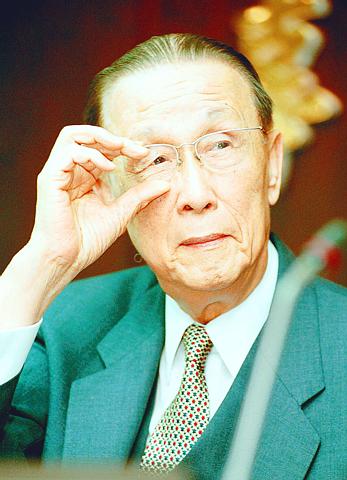Commemorating the seventh anniversary of the Koo-Wang talks which were held in Singapore, Taiwan's top cross-strait negotiator yesterday urged governments on both sides of the Strait to return to the 1992 consensus to allow individual interpretations of "one China."
"The only way to break the current stalemate is to return to the 1992 consensus," said Koo Chen-fu (辜振甫), chairman of the Straits Exchange Foundation (SEF).
"If one side is too obstinate or the other too rigidly persistent, it creates an obstacle to constructive exchange," Koo said during a press conference yesterday.

PHOTO: CHIANG YING-YING, TAIPEI TIMES
In the 1992 meeting with his Chinese counterpart, Wang Daohan (汪道涵), of the Association for Relations Across the Strait (ARATS), the two had agreed to disagree on the definition of "one China."
Beijing however, later reneged on the verbal agreement and issued a white paper in November 1993 on "the Taiwan question and reunification."
In it, Beijing maintained that there is only "one China," with the PRC being the sole legitimate government and Taiwan being a part of China.
Under the KMT government, Taiwan has previously accepted the "one China" concept, but has defined it as an abstract, historical and future concept. This changed, however, when President Lee Teng-hui (李登輝) made his "state-to-state" statement last July. Many saw this as a step by the president to distance Taiwan from the 1992 consensus.
President-elect Chen Shui-bian (陳水扁) has brushed aside the individual interpretation agreement by questioning whether such consensus was ever made and instead has suggested that cross-strait talks treat "one China" as a topic of discussion rather than the defining principle of any talks.
"It's clear we can't accept the `one China' model as defined by the mainland," Koo told reporters. "Our `one China' is based on equal status and separate government," he said.
He urged Beijing to allow more flexibility in their definition of "one China," by recognizing that there is not yet a unified China.
"Instead of saying Taiwan is a part of China, why not say that `Taiwan is ALSO a part of China?" Koo said.
Koo hinted he would be willing to "bridge" the differences between the KMT and the new government on the "one China" question, but declined to say whether President-elect Chen will address the issue in his May 20 inauguration speech.
SEF secretary-general Shi Hwei-yow (
"China should not view Chen's suggestions with so much suspicion," Shi told reporters after the press conference.
"Taking `one China' as an issue of discussion may be more progressive and pragmatic than just having each side march to the beat of their own drums," he said.
However, a possible deadlock over what exactly "one China" means may also prove to be a setback for cross-strait relations, Shi added.

The CIA has a message for Chinese government officials worried about their place in Chinese President Xi Jinping’s (習近平) government: Come work with us. The agency released two Mandarin-language videos on social media on Thursday inviting disgruntled officials to contact the CIA. The recruitment videos posted on YouTube and X racked up more than 5 million views combined in their first day. The outreach comes as CIA Director John Ratcliffe has vowed to boost the agency’s use of intelligence from human sources and its focus on China, which has recently targeted US officials with its own espionage operations. The videos are “aimed at

STEADFAST FRIEND: The bills encourage increased Taiwan-US engagement and address China’s distortion of UN Resolution 2758 to isolate Taiwan internationally The Presidential Office yesterday thanked the US House of Representatives for unanimously passing two Taiwan-related bills highlighting its solid support for Taiwan’s democracy and global participation, and for deepening bilateral relations. One of the bills, the Taiwan Assurance Implementation Act, requires the US Department of State to periodically review its guidelines for engagement with Taiwan, and report to the US Congress on the guidelines and plans to lift self-imposed limitations on US-Taiwan engagement. The other bill is the Taiwan International Solidarity Act, which clarifies that UN Resolution 2758 does not address the issue of the representation of Taiwan or its people in

US Indo-Pacific Commander Admiral Samuel Paparo on Friday expressed concern over the rate at which China is diversifying its military exercises, the Financial Times (FT) reported on Saturday. “The rates of change on the depth and breadth of their exercises is the one non-linear effect that I’ve seen in the last year that wakes me up at night or keeps me up at night,” Paparo was quoted by FT as saying while attending the annual Sedona Forum at the McCain Institute in Arizona. Paparo also expressed concern over the speed with which China was expanding its military. While the US

SHIFT: Taiwan’s better-than-expected first-quarter GDP and signs of weakness in the US have driven global capital back to emerging markets, the central bank head said The central bank yesterday blamed market speculation for the steep rise in the local currency, and urged exporters and financial institutions to stay calm and stop panic sell-offs to avoid hurting their own profitability. The nation’s top monetary policymaker said that it would step in, if necessary, to maintain order and stability in the foreign exchange market. The remarks came as the NT dollar yesterday closed up NT$0.919 to NT$30.145 against the US dollar in Taipei trading, after rising as high as NT$29.59 in intraday trading. The local currency has surged 5.85 percent against the greenback over the past two sessions, central